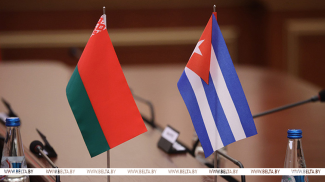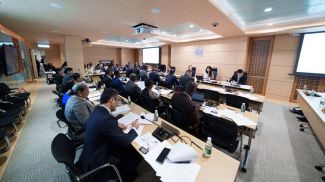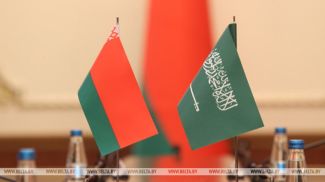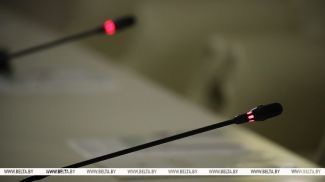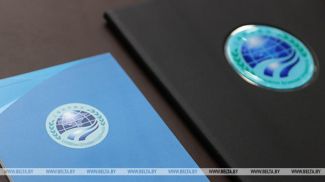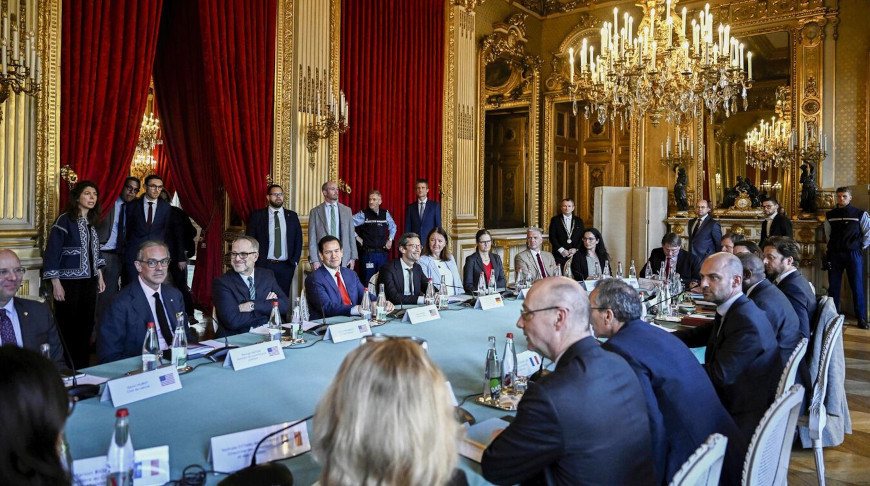
U.S. President Donald Trump's top envoys met with European powers and Ukraine in Paris on 18 April. The State Department said that a U.S. peace framework received an "encouraging reception." Similar assessments were issued by the Elysee Palace. On the same day, U.S. Secretary of State Marco Rubio had a telephone conversation with Russian Foreign Minister Sergey Lavrov. The U.S. diplomat informed his Russian counterpart about contacts with the Europeans. Lavrov, for his part, reaffirmed Moscow's commitment to continuing working together with the USA to eliminate the root causes of the Ukrainian crisis.
Meanwhile, US President Donald Trump said he expects a response from Russia regarding a possible peace agreement with Ukraine later this week. Marco Rubio suggested that it might not be doable. In that case, the United States will move on from Ukraine peace efforts as it is “not their war”.
Consultations in Paris. What is known?
The Paris talks on 17 April were attended by representatives of the United States, France, the United Kingdom, Germany and Ukraine. First, France's President Emmanuel Macron hosted Rubio and Trump's Russian envoy Steve Witkoff at the Elysee Palace. No statements wre issued afterwards.
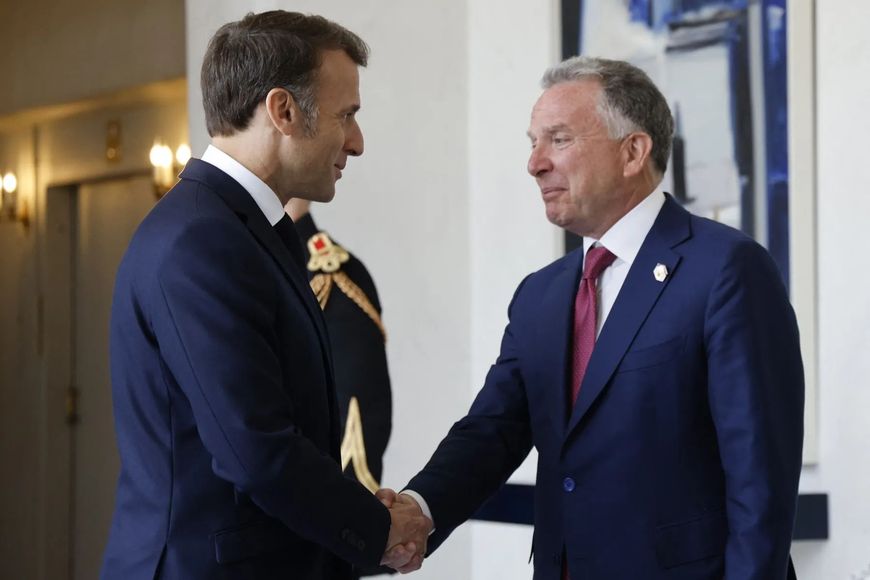
The Ukrainian Foreign Ministry said in its Telegram channel that the Ukrainian delegation and European allies would discuss ceasefire, deployment of a multinational military contingent and security guarantees to Kiev.
On the whole, no specifics were voiced following the consultations in Paris. It is not known what was discussed behind closed doors. However, the tone of the final statements was positive.
The Elysee Palace described the talks as constructive and an important “convergence”. The statement also noted that the Paris talks marked the beginning of a more structured European role in the peace process.
Macron promised to step up efforts to achieve peace. “We are intensifying our efforts for peace in Ukraine and in the Middle East. Coordination among allies is essential,” the French president wrote on X. He also noted that the ‘positive and constructive discussion’ in Paris was not only about the ceasefire, but also about achieving a comprehensive, lasting peace.


Unrealistic at this stage. How does Moscow see the situation?
According to the Russian Ministry of Foreign Affairs, Marco Rubio informed Sergey Lavrov about contacts with representatives of Ukraine, France and a number of other European countries. “It was emphasized that the mentioned contacts took place in line with the topics of consultations held between Washington and Moscow, including the recent conversation between Russian President Vladimir Putin and Steve Witkoff in St. Petersburg,” the ministry said.
The Russian Ministry of Foreign Affairs added that Moscow is ready to continue cooperation with the USA to resolve the Ukrainian crisis. “Sergey Lavrov reiterated Moscow's readiness to continue working together with U.S. colleagues to reliably address the root causes of the Ukrainian crisis. The minister and the secretary of state agreed to maintain operational communication, including in light of the meetings of the U.S. and European representatives with Ukrainian representatives scheduled for next week,” the Russian ministry said.
At the same time, Russia draws attention to the fact that Kiev has repeatedly violated the agreements, including during the 30-day moratorium on striking energy infrastructure.
“We once again underscore the Kiev regime’s failure to adhere to the 30-day moratorium on strikes against the fuel and energy complex (FEC) facilities. The Armed Forces of Ukraine (AFU) have conducted nearly daily UAV raids targeting Russian fuel and energy infrastructure. Since the declared ‘energy truce’, over 80 such attacks have been recorded,” spokeswoman for the Russian Ministry of Foreign Affairs Maria Zakharova said.
Meanwhile, US President Donald Trump said he expects a response from Russia regarding a possible peace agreement with Ukraine later this week. Marco Rubio suggested that it might not be doable. In that case, the United States will move on from Ukraine peace efforts as it is “not their war”.
Consultations in Paris. What is known?
The Paris talks on 17 April were attended by representatives of the United States, France, the United Kingdom, Germany and Ukraine. First, France's President Emmanuel Macron hosted Rubio and Trump's Russian envoy Steve Witkoff at the Elysee Palace. No statements wre issued afterwards.

The US delegation then held talks with French Foreign Minister Jean-Noël Barrot, British Prime Minister's national security adviser Jonathan Powell, German Chancellor’s Foreign and Security Policy Advisor Jens Plötner and the head of Vladimir Zelensky's office, Andrei Yermak.
Ahead of the visit to France, State Department spokeswoman Tammy Bruce said that Rubio and Witkoff “are in Paris today with a clear motivation: to find a path forward to end the Russia-Ukraine war in order to stop the bloodshed. The visit, which includes meetings with European partners, aims to advance the shared interests and restore stability to the region.”
Already in Paris, Rubio wrote on X that the purpose of the visit was to find a solution to the Ukrainian conflict. “Arrived in Paris with one goal in mind: secure real, practical solutions to end the Russia-Ukraine war… Our main objective is to carry out POTUS’s goal to end this war and stop the unnecessary bloodshed,” he wrote.
Ahead of the visit to France, State Department spokeswoman Tammy Bruce said that Rubio and Witkoff “are in Paris today with a clear motivation: to find a path forward to end the Russia-Ukraine war in order to stop the bloodshed. The visit, which includes meetings with European partners, aims to advance the shared interests and restore stability to the region.”
Already in Paris, Rubio wrote on X that the purpose of the visit was to find a solution to the Ukrainian conflict. “Arrived in Paris with one goal in mind: secure real, practical solutions to end the Russia-Ukraine war… Our main objective is to carry out POTUS’s goal to end this war and stop the unnecessary bloodshed,” he wrote.
The Ukrainian Foreign Ministry said in its Telegram channel that the Ukrainian delegation and European allies would discuss ceasefire, deployment of a multinational military contingent and security guarantees to Kiev.
On the whole, no specifics were voiced following the consultations in Paris. It is not known what was discussed behind closed doors. However, the tone of the final statements was positive.
The Elysee Palace described the talks as constructive and an important “convergence”. The statement also noted that the Paris talks marked the beginning of a more structured European role in the peace process.
Macron promised to step up efforts to achieve peace. “We are intensifying our efforts for peace in Ukraine and in the Middle East. Coordination among allies is essential,” the French president wrote on X. He also noted that the ‘positive and constructive discussion’ in Paris was not only about the ceasefire, but also about achieving a comprehensive, lasting peace.
The website of the U.S. Department of State has only a short statement about the phone call between Rubio and Lavrov.
“Secretary of State Marco Rubio spoke today with Russian Foreign Minister Sergey Lavrov. The Secretary conveyed to his Russian counterpart the same message the U.S. team communicated to the Ukrainian delegation and our European allies in Paris: President Trump and the United States want this war to end, and have now presented to all parties the outlines of a durable and lasting peace. The encouraging reception in Paris to the U.S. framework shows that peace is possible if all parties commit to reaching an agreement,” the statement by the U.S. Department of State reads.
However, later, speaking to journalists, Rubio admitted that the parties may never come to terms. “If it is not possible to end the war in Ukraine, we need to move on,” Rubio said before leaving Paris.

Marco Rubio. Photo courtesy of AP
“The United States has been helping Ukraine for the past three years and we want it to end, but it’s not our war. President Trump has spent 87 days at the highest level of this government repeatedly taking efforts to bring this war to an end. We are now reaching a point when we need to decide and determine whether this is even possible or not. Which is why we’re engaging both sides,” Rubio said.
“We need to determine very quickly now, and I’m talking about a matter of days, whether or not this is doable,” he told reporters.
The head of the U.S. Department of State also said that European countries should be involved in the Ukraine peace process so that the lifting of anti-Russian sanctions by the EU could become part of the arrangement. He also emphasized the importance of dialogue with Russia.
Meanwhile, France announced another round of consultations that are due to take place in London next week. It is still unclear whether or not the American delegation will take part in the discussions. “We will not hold meetings for the sake of meetings,” said U.S. Department of State spokeswoman Tammy Bruce.
What did Trump say?
U.S. President Donald Trump said on 17 April that he expected to clarify the situation regarding a possible ceasefire in Ukraine this week.
“We'll see what that will be. We're going to be hearing from them this week. Very shortly, actually,” Trump told journalists in the While House.
At the same time, the American leader believes that a ceasefire is getting closer. “I think we're getting close, but we'll let you know very soon,” Trump said.

Donald Trump. Photo courtesy of AP
At the same time, the U.S. president criticized Zelensky again, noting that he was dissatisfied with his work. “I am not happy with him... I don't hold Zelensky responsible but I'm not exactly thrilled with the fact that that war started,” Trump said.
“I'm not blaming him, but what I am saying is that I wouldn't say he's done the greatest job. I am not a big fan. That's true,” the American leader added referring to Zelensky.
“As you know, Russia is much bigger as a military force, and, if you're smart, you don't get involved in wars that you can't handle later,” Trump said.
According to the Russian Ministry of Foreign Affairs, Marco Rubio informed Sergey Lavrov about contacts with representatives of Ukraine, France and a number of other European countries. “It was emphasized that the mentioned contacts took place in line with the topics of consultations held between Washington and Moscow, including the recent conversation between Russian President Vladimir Putin and Steve Witkoff in St. Petersburg,” the ministry said.
The Russian Ministry of Foreign Affairs added that Moscow is ready to continue cooperation with the USA to resolve the Ukrainian crisis. “Sergey Lavrov reiterated Moscow's readiness to continue working together with U.S. colleagues to reliably address the root causes of the Ukrainian crisis. The minister and the secretary of state agreed to maintain operational communication, including in light of the meetings of the U.S. and European representatives with Ukrainian representatives scheduled for next week,” the Russian ministry said.
At the same time, Russia draws attention to the fact that Kiev has repeatedly violated the agreements, including during the 30-day moratorium on striking energy infrastructure.
“We once again underscore the Kiev regime’s failure to adhere to the 30-day moratorium on strikes against the fuel and energy complex (FEC) facilities. The Armed Forces of Ukraine (AFU) have conducted nearly daily UAV raids targeting Russian fuel and energy infrastructure. Since the declared ‘energy truce’, over 80 such attacks have been recorded,” spokeswoman for the Russian Ministry of Foreign Affairs Maria Zakharova said.
She emphasized that any agreements in the context of the conflict settlement in Ukraine are binding. “Any parameters that will be worked out in the context of possible future agreements must be fulfilled by the parties, and in this case the Kiev regime demonstrates absolute inability to negotiate, as it has demonstrated before,” Maria Zakharova said.
According to the diplomat, all violations are recorded and sent to international organizations and the USA.
Russia's Permanent Representative to the United Nations Vasily Nebenzya also spoke about the possibility of a ceasefire in Ukraine, TASS reported.
“We had an attempt at a limited ceasefire concerning energy infrastructure, which was not observed by the Ukrainian side. Under these circumstances, it is simply unrealistic to talk about a ceasefire at this point,” he said.
He also noted that the development and adoption of a UN Security Council document in support of a potential ceasefire in Ukraine would depend on the terms of a possible agreement.
“We already have one resolution calling for an end to the conflict, which was adopted at the initiative of the United States. We will see exactly what will be necessary to do in the Security Council if we reach any agreement. It all depends on the conditions of a possible ceasefire and the language of the document,” the diplomat concluded.
Vita Khanatayeva
BelTA
According to the diplomat, all violations are recorded and sent to international organizations and the USA.
Russia's Permanent Representative to the United Nations Vasily Nebenzya also spoke about the possibility of a ceasefire in Ukraine, TASS reported.
“We had an attempt at a limited ceasefire concerning energy infrastructure, which was not observed by the Ukrainian side. Under these circumstances, it is simply unrealistic to talk about a ceasefire at this point,” he said.
He also noted that the development and adoption of a UN Security Council document in support of a potential ceasefire in Ukraine would depend on the terms of a possible agreement.
“We already have one resolution calling for an end to the conflict, which was adopted at the initiative of the United States. We will see exactly what will be necessary to do in the Security Council if we reach any agreement. It all depends on the conditions of a possible ceasefire and the language of the document,” the diplomat concluded.
Vita Khanatayeva
BelTA




